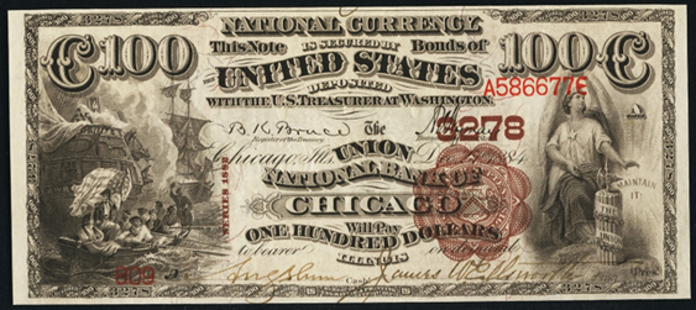One Hundred Dollar Notes › Nationals › 1882 One Hundred Dollar National Bank Notes › Kansas Charters › 1882 $100 Saint John Kansas First National Bank
Get Value Now
| Item | Info |
|---|---|
| Series | 1882 |
| Charter | #3467 First National Bank of Saint John, Kansas |
| Year Chartered | 1886, 184 Banks Chartered |
| City Info | St. John is a city in and the county seat of Stafford County, Kansas, United States. As of the 2010 census, the city population was 1,295. The first settlement in what is today St. John was made in 1875 when William Bickerton of the Church of Jesus Christ founded a religious colony named Zion Valley. By 1879, Zion Valley had grown into a small town, and the residents renamed it St. John, after then governor John P. St. John, in order to gain favor in winning the county seat of Stafford County. Source: Wikipedia |
| Similar Cities | If your note doesn't match try: 1. Saint Johnsville, New York - First National Bank 2. Saint Johnsbury, Vermont - First National Bank 3. Saint Johns, Michigan - First National Bank 4. Saint Johnsbury, Vermont - Merchants National Bank 5. Saint John's, Michigan - Saint John's National Bank |
| Seal Varieties | Brown, Blue |
| See Also | If your note doesn't match try: 1. 1882 $100 Gold Certificate 2. 1878 $100 Legal Tender 3. 1880 $100 Legal Tender |
| Other Info | 1. Value depends on notes known for charter, condition and market demand. 2. Rare and highly desirable National Note. |
| Neat Fact | Some issues contain regional geographic identifiers. N = New England. E = Eastern. M = Midwest. S = Southern. W = Western. P = Pacific. The letters were included for hand sorting purposes (Kelley, 5th Ed. P 5). |
No Obligations Offers and Appraisals
Please submit a good photo or scan. It will be identified and evaluated. Understand there may be subtle differences between the image you see above and your note. Signatures, design, markings and note condition will determine the offer price. Notes in Uncirculated or better condition receive the best offers.
Appraisals can be estimated for wholesale and retail prices. Wholesale is what dealers typically pay. Retail is what a collector might pay. Retail is slightly higher in most cases.
Please visit this page for USA Paper Money Reference. Do not treat this page as a reference guide, it is for appraisal and acquisition purposes only.
